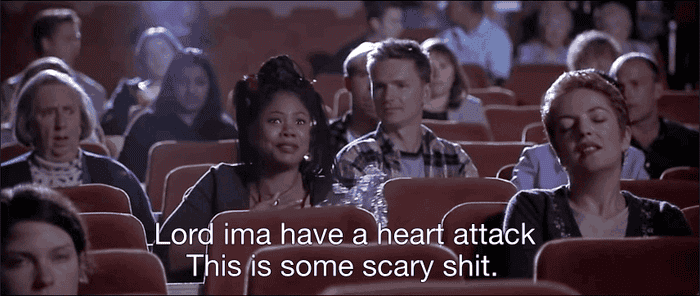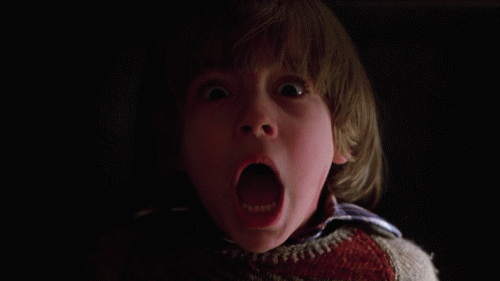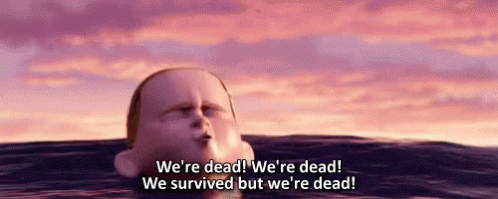 Warner Bros. Pictures/DreamWorks Pictures
Warner Bros. Pictures/DreamWorks PicturesThe sharp inhales, the stirring discomfort in your belly, the clenched fists and toes and the inevitable lung-emptying scream. ‘It’s Halloween, everyone’s entitled to one good scare.’
Horror movies come part-and-parcel with the spooky season, as friends and families around the world huddle around their screens to relish in ‘tasty, tasty, beautiful fear’.
However, being afraid is a subjective phenomenon: what’s petrifying for one can be mundane for another. But there are reasons we love to torture ourselves with bloody delights and devilish sights – and it’s actually good for you, too.
 Paramount Pictures
Paramount PicturesPicture the scene: it’s October 31 and you, your partner and a few friends pop on The Conjuring. As the film descends into its infamous Hide and Clap sequence, a case of white knuckles possesses the viewers. Clap! Screeches erupt – but then, from the fallout of the scare, laughter emerges.
This is a perfectly natural, common reaction. According to psychoanalyst Steve McKeown, of The McKeown Clinic and YouTube’s themindguru, it’s all about how horror twists our inbuilt fight-or-flight instinct to survive.
 Dimension Films
Dimension FilmsMcKeown explained this to UNILAD, saying:
When someone startles you in a Halloween costume, you immediately assess whether it’s real or not. At that point, your body determines if there is a real threat or not, which in this case it’s not because you know it’s Halloween and act appropriately. If there is no immediate threat, the physiological and psychological mechanisms calm, and there is no more reaction.
At this point what happens is fight-or-flight kicks in – but to your benefit. If you imagine you’re in a haunted scary house, you know it’s not real but it still scares you because you know you are safe.
If your body senses that you aren’t threatened, you will still experience the actual fear, but instead of releasing the stress hormone cortisol your body actually releases the hormone dopamine and makes you feel good! It simply hijacks the flight response and enjoys it. In this case a common occurrence after someone has been scared is hysterical laughing.
A fright is a fickle thing – the size of its impact can equal a character-building moment, forgettably joyous adrenaline or genuine trauma.
 Warner Bros.
Warner Bros.Everyone remembers their first scary movie (mine was Thir13en Ghosts – that automatic door kill still replays in my head regularly). Showing young children more sedate horrors can be a fun way to introduce them to films – but too far along the spectrum and they’ll be battling nightmares for years.
When we’re in a situation that induces fear, whether it be atop a tall building, looking at a big spider or surrounded in impenetrable darkness, McKeown explains the fear reaction kicks in, starting in the area of the brain called the amygdala and ‘continuing throughout the physical body to make alterations for a possible defence’.
 Warner Bros.
Warner Bros.It’s even more effective in the dark – the lack of sight of your surroundings detaches you from reality even further, leaving you alone with the fierce glow of the screen.
Fear makes us feel alive. It’s part of our DNA, nobody is immune to that blood-rushing force. And some instigators are universal – psychologist James Geer developed the ‘Fear Survey Schedule II’ to find out what scared people the most.
Suffocating, death, spiders, nuclear war and being self-conscious topped the fear factor ranks – but when it comes to theatrical horror in entertainment, the criteria for arousing your distress isn’t about what’s real.
 ABC
ABCStephen King, author of IT, The Shining and Carrie, professes there’s three types of terror an audience can endure: the gross-out, the horror and simply, the terror.
The iconic writer explained:
The gross-out: the sight of a severed head tumbling down a flight of stairs, it’s when the lights go out and something green and slimy splatters against your arm.
The horror: the unnatural, spiders the size of bears, the dead waking up and walking around, it’s when the lights go out and something with claws grabs you by the arm.
And the last and worst one: terror, when you come home and notice everything you own had been taken away and replaced by an exact substitute. It’s when the lights go out and you feel something behind you, you hear it, you feel its breath against your ear, but when you turn around, there’s nothing there.
What scares you and what you enjoy are all dependent on personality, according to McKeown. Some get tough-stomached (and harmless) thrills out of torture porn outings like Saw and Hostel – firmly in the gross-out camp.
 Artisan Entertainment
Artisan EntertainmentOthers go ga-ga for zombie films like Dawn of the Dead and 28 Days Later, which both exemplify the unnatural qualities of ‘horror’. And then, you have something like The Blair Witch Project – the apex embodiment of King’s definition of terror.
The best horrors blend elements of all three: a prime example is Stanley Kubrick’s The Shining, and the ‘Come play with us’ sequence. In the twins’ unparalleled creepiness and butchered, horrific mirage, they transcend King’s categories (fitting that he wrote them).
It’s that sadistic window between peace and fright that creates the most complex emotions. As per Vsauce’s fantastic Why Are Things Creepy?, we find something unsettling (causing alterations in breathing and tense movements) when what we see or experience ‘straddles a line between regions that we can explain with language’.
Check out the video below:
It’s like when Tim Curry’s Pennywise first meets Georgie in the sewer, or when the man in the mask emerges from the background in The Strangers, before disappearing again – there’s no discernible threat, yet the unease is palpable. As per Francis T. McAndrew and Sara S. Koehnke, being creeped out is an adaptive human response to the ambiguity of threats of others.
But, of course, it’s the sadistic cocktail of the creeps, pulse-racing jump-scares and full-blown terror all while sitting in a safe place that creates the unique hit a horror movie provides – Alfred Hitchcock once said: ‘There is no terror in the bang, only the anticipation of it.’
 Rogue Pictures
Rogue PicturesShort-term stress can be beneficial as it can boost performance as well as increasing our immune system, according to McKeown. Also, ‘people who like being scared out of their wits are more likely to enjoy challenges and thrills than those that do not’.
However, not everyone can handle regular doses of the genre – it may be healthy, but unless you’re a hardened horror nut, moderation is key.
 Buena Vista Pictures
Buena Vista PicturesMcKeown explained:
It can be unhealthy if you are chronically scared and stressed. This is because when there’s excessive amounts of adrenaline and cortisol in the heart, this can lead to irregular heartbeats and the tightening of arteries. Which in some people could result in a heart attack.
It’s best to have a break and take a few nights off to allow yourself to recover. It’s very much the same as bodybuilding, you put your body through stress, you take a few days off to recover, after which your body becomes stronger. When you do too much, you get injured. It’s the same with scary movies that cause stress.
Stuart Fischoff, professor emeritus of psychology at California State University, Los Angeles, and senior editor of the online Journal of Media Psychology, explained to The Daily Beast the love of the stress lies in its temporary nature: ‘We know that, in an hour or two, we’re going to walk out whole.’
 Disney
DisneyFischoff added:
Films like Paranormal Activity 3 have a pre-registered audience just waiting for the latest Hollywood bouquet of blood, sweat, tears and chills to exquisitely fill our lust for horribly sweet sensations.
One of the major reasons we go to scary movies is to be scared… we seek out something that’s going to be exciting for us, because our nervous system requires periodic revving, just like a good muscular engine.
It’s all about catharsis. Horrors prevent a snapshot of worlds terrifyingly out of control, whether it be an apocalyptic virus or suburbia ravaged by the paranormal. To venture through darkness and escape unscathed is an emotional earthquake, with tremors that entice you to come back for more.
This Halloween, makes sure you have fun. Oh, and ‘be afraid, be very afraid’.
If you have a story you want to tell, send it to UNILAD via [email protected]
After graduating from Glasgow Caledonian University with an NCTJ and BCTJ-accredited Multimedia Journalism degree, Cameron ventured into the world of print journalism at The National, while also working as a freelance film journalist on the side, becoming an accredited Rotten Tomatoes critic in the process. He’s now left his Scottish homelands and took up residence at UNILAD as a journalist.